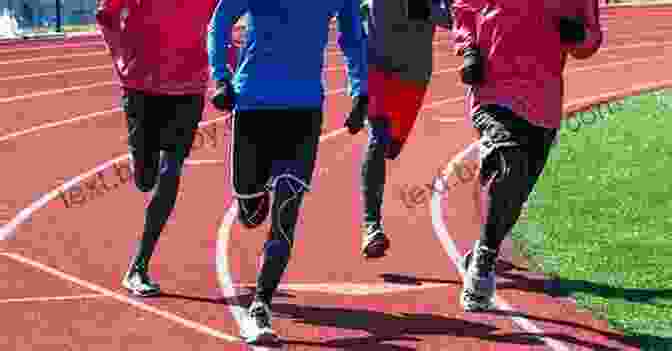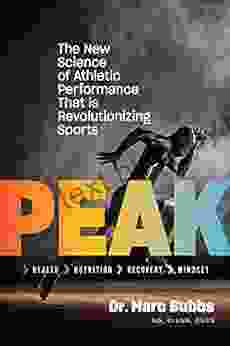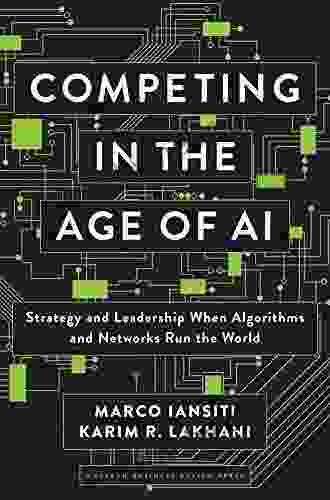The New Science Of Athletic Performance That Is Revolutionizing Sports


4.7 out of 5
| Language | : | English |
| File size | : | 18967 KB |
| Text-to-Speech | : | Enabled |
| Screen Reader | : | Supported |
| Enhanced typesetting | : | Enabled |
| X-Ray | : | Enabled |
| Word Wise | : | Enabled |
| Print length | : | 363 pages |
In the competitive world of sports, athletes are constantly striving to improve their performance and gain an edge over their rivals. Traditional training methods have long been the cornerstone of athletic development, but in recent years, a new science of athletic performance has emerged that is revolutionizing the way athletes train and compete.
This new science is based on the latest research in biomechanics, physiology, nutrition, and psychology. It provides a deeper understanding of how the human body works and how it can be trained to perform at optimal levels. As a result, athletes are now able to train smarter, recover faster, and push the boundaries of human potential.
The Key Principles Of The New Science Of Athletic Performance
The new science of athletic performance is based on a number of key principles, including:
- Individualization: Every athlete is unique, and therefore, their training program should be tailored to their individual needs. This includes taking into account their age, sex, sport, training history, and injury risk.
- Periodization: Training should be divided into different phases, each with a specific focus. This allows athletes to gradually progress their training and avoid overtraining.
- Progression: Training should be progressively challenging in Free Download to continue to stimulate adaptations. This can be done by increasing the volume, intensity, or complexity of the training.
- Recovery: Recovery is an essential part of the training process. It allows the body to repair itself and rebuild stronger. Athletes need to get enough sleep, eat a healthy diet, and engage in active recovery activities.
- Mental training: Mental training is just as important as physical training. Athletes need to be able to focus, stay motivated, and perform under pressure.
The Benefits Of The New Science Of Athletic Performance
The new science of athletic performance has a number of benefits for athletes, including:
- Improved performance: Athletes who train using the principles of the new science of athletic performance have been shown to improve their performance in a variety of sports.
- Reduced injury risk: The new science of athletic performance can help athletes reduce their risk of injury by teaching them how to train properly and recover effectively.
- Faster recovery: The new science of athletic performance can help athletes recover faster from injuries and training sessions.
- Increased motivation: Athletes who train using the principles of the new science of athletic performance are more likely to be motivated and engaged in their training.
- Greater longevity: Athletes who train using the principles of the new science of athletic performance are more likely to have a long and successful career.
How To Apply The New Science Of Athletic Performance To Your Training
If you are an athlete looking to improve your performance, the new science of athletic performance can help you reach your goals. Here are a few tips on how to apply the principles of the new science of athletic performance to your training:
- Get individualized advice from a qualified coach or trainer. A qualified coach or trainer can help you develop a training program that is tailored to your individual needs.
- Periodize your training. Divide your training into different phases, each with a specific focus. This will help you gradually progress your training and avoid overtraining.
- Progress your training gradually. Increase the volume, intensity, or complexity of your training gradually in Free Download to continue to stimulate adaptations.
- Recover adequately. Get enough sleep, eat a healthy diet, and engage in active recovery activities to allow your body to repair itself and rebuild stronger.
- Train your mind. Mental training is just as important as physical training. Focus on developing your focus, motivation, and resilience.
The new science of athletic performance is revolutionizing the way athletes train and compete. By understanding the principles of the new science of athletic performance, you can unlock your full potential and achieve extraordinary results in sports.
4.7 out of 5
| Language | : | English |
| File size | : | 18967 KB |
| Text-to-Speech | : | Enabled |
| Screen Reader | : | Supported |
| Enhanced typesetting | : | Enabled |
| X-Ray | : | Enabled |
| Word Wise | : | Enabled |
| Print length | : | 363 pages |
Do you want to contribute by writing guest posts on this blog?
Please contact us and send us a resume of previous articles that you have written.
 Book
Book Novel
Novel Page
Page Chapter
Chapter Text
Text Story
Story Genre
Genre Reader
Reader Library
Library Paperback
Paperback E-book
E-book Magazine
Magazine Newspaper
Newspaper Paragraph
Paragraph Sentence
Sentence Bookmark
Bookmark Shelf
Shelf Glossary
Glossary Bibliography
Bibliography Foreword
Foreword Preface
Preface Synopsis
Synopsis Annotation
Annotation Footnote
Footnote Manuscript
Manuscript Scroll
Scroll Codex
Codex Tome
Tome Bestseller
Bestseller Classics
Classics Library card
Library card Narrative
Narrative Biography
Biography Autobiography
Autobiography Memoir
Memoir Reference
Reference Encyclopedia
Encyclopedia Maggie Craft
Maggie Craft Manfred Kuehn
Manfred Kuehn Margo Jefferson
Margo Jefferson Minqi Li
Minqi Li Lisa Ludwinski
Lisa Ludwinski Teri Sloat
Teri Sloat Rajendra Sisodia
Rajendra Sisodia Yuu Tanaka
Yuu Tanaka R Scott Jones
R Scott Jones Marilyn Yalom
Marilyn Yalom Robert Kerbeck
Robert Kerbeck Neela Vaswani
Neela Vaswani Tedd Tripp
Tedd Tripp Nicholeen Peck
Nicholeen Peck Thao Doan
Thao Doan Thomas Hollowell
Thomas Hollowell William Hazlitt
William Hazlitt Rick Heard
Rick Heard Madelyn Holmes
Madelyn Holmes Marcus Chown
Marcus Chown
Light bulbAdvertise smarter! Our strategic ad space ensures maximum exposure. Reserve your spot today!
 Mike HayesFollow ·7.4k
Mike HayesFollow ·7.4k Ignacio HayesFollow ·11.1k
Ignacio HayesFollow ·11.1k Duncan CoxFollow ·18.8k
Duncan CoxFollow ·18.8k Emanuel BellFollow ·18.4k
Emanuel BellFollow ·18.4k Jacob HayesFollow ·3.1k
Jacob HayesFollow ·3.1k Isaiah PowellFollow ·13k
Isaiah PowellFollow ·13k John MiltonFollow ·13k
John MiltonFollow ·13k Robert FrostFollow ·2.2k
Robert FrostFollow ·2.2k

 Clay Powell
Clay Powell20 Must Visit Attractions In La Paz, Bolivia
La Paz, Bolivia...

 Giovanni Mitchell
Giovanni MitchellUltimate Guide to Special Forces Skills, Tactics, and...
The world of...

 Joseph Heller
Joseph HellerThe Texas Ranger and Hunter Illustrated: A Visual Journey...
Prepare to embark on an...

 José Martí
José MartíThe Secrets and Science of Ads That Sell More: A...
Are you struggling to create...

 Eli Blair
Eli BlairAdolescents and Their Families: A Comprehensive Guide for...
Adolescence,...

 Neil Gaiman
Neil GaimanMosby Diagnostic and Laboratory Test Reference: The...
In the dynamic healthcare landscape, staying...
4.7 out of 5
| Language | : | English |
| File size | : | 18967 KB |
| Text-to-Speech | : | Enabled |
| Screen Reader | : | Supported |
| Enhanced typesetting | : | Enabled |
| X-Ray | : | Enabled |
| Word Wise | : | Enabled |
| Print length | : | 363 pages |












